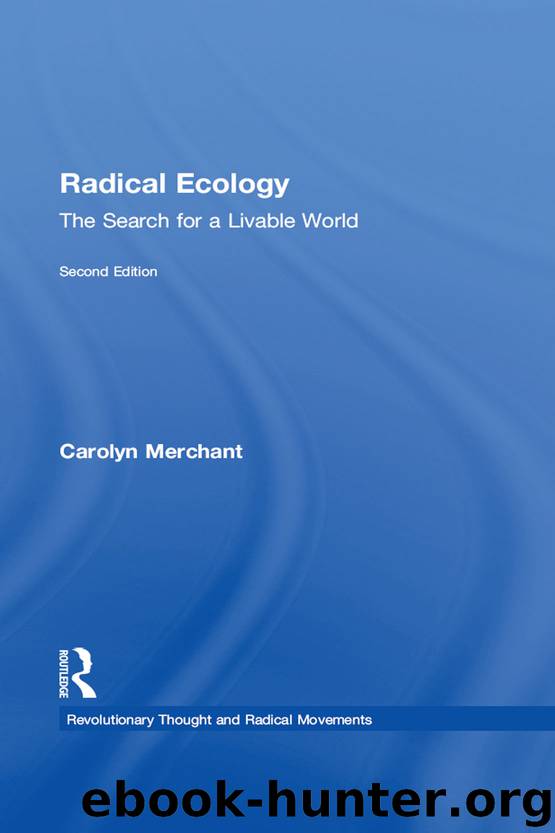Radical Ecology by Merchant Carolyn;

Author:Merchant, Carolyn;
Language: eng
Format: epub
Publisher: Taylor and Francis
Figure 6.1 Marxist Framework of Social Analysis
Source: Howard Sherman, Foundations of Radical Political Economy (Armonk, NY: M.E. Sharpe, 1987), 44, reprinted by permission.
ANARCHIST SOCIAL ECOLOGY
Current theories of social ecology draw on Marx and Engels’ approach to “ecology” and society. Additionally, social ecologists draw their ideas from premodern tribal societies, Eastern cultures, and from analyzing the ecological problems of capitalist, socialist, and Third World countries. For anarchist philosopher Murray Bookchin, social ecology is rooted in the balance of nature, process, diversity, spontaneity, freedom, and wholeness. His ideal society would eliminate all hierarchies in ecology and in society. The ecological society of the future would reclaim the fundamental organic non-hierarchical relationships of preliterate peoples. This would not be a return to a foraging economy or to a “primitive” past, however, but a movement beyond capitalism and toward a society free of the domination of human beings and the exploitation of human labor. Above all, it would value human reason and human freedom.9
Early preliterate societies, Bookchin argues, were organic. Although there were differences based on age, gender and kinship, such societies saw themselves as neither superior to nor inferior to nonhuman nature. They were within nature. Their differences with each other and with nature constituted what Hegel called a “unity of differences,” or a “unity of diversity.” Male decision-making roles in the civil sphere were balanced by the power of women in the domestic sphere. Women's central role in foraging and horticulture offset men's role in hunting. With the continuing influence of elders, however, male authority and prestige increased and organic society broke down. Hierarchy destroyed the original egalitarian balance; males became dominant over females and children. Scarcity and warfare escalated the problems created by the twin pillars of dominance and hierarchy, and non-egalitarian culture continued in all subsequent societies. Today dominance and hierarchy permeate all aspects of life, especially in the dominance of the intellectual over the physical, work over pleasure, and mental control over sensuous body. A major goal of social ecology is to abolish these dualisms.10
Capitalism not only reinforces such dualisms, but it stands in fundamental contradiction to the autonomy of the natural world. Its growth-oriented imperative drives society ever more deeply into the devastation of nature. Pollution, radioactive fallout, toxics in food, and environmental degradation are all inevitable products of capitalist development. Capitalism has not only created a totally synthetic environment, but has demonstrated a remarkable resilience and ability to absorb ideas that seem opposed to it. It embraces any religions and forms of spirituality as long as they do not challenge its dominance.11
In an ecological society, Bookchin argues, dominance and hierarchy would be replaced by equality and freedom. An “ecology of freedom” would reunite humans with nature and humans with humans. This would be achieved through an organic, process-oriented, dialectic that would reclaim the outlook of preliterate peoples. The merging of their ecological sensibility with the analytical approach of western culture would produce a new consciousness. Thus the advances of science and technology could be retained and infused with an ecological way of living in the world.
Download
This site does not store any files on its server. We only index and link to content provided by other sites. Please contact the content providers to delete copyright contents if any and email us, we'll remove relevant links or contents immediately.
Cecilia; Or, Memoirs of an Heiress — Volume 1 by Fanny Burney(32054)
Cecilia; Or, Memoirs of an Heiress — Volume 3 by Fanny Burney(31453)
Cecilia; Or, Memoirs of an Heiress — Volume 2 by Fanny Burney(31402)
The Great Music City by Andrea Baker(30779)
We're Going to Need More Wine by Gabrielle Union(18626)
All the Missing Girls by Megan Miranda(14711)
Pimp by Iceberg Slim(13774)
Bombshells: Glamour Girls of a Lifetime by Sullivan Steve(13680)
Fifty Shades Freed by E L James(12908)
Talking to Strangers by Malcolm Gladwell(12865)
Norse Mythology by Gaiman Neil(12820)
For the Love of Europe by Rick Steves(11443)
Crazy Rich Asians by Kevin Kwan(8883)
Mindhunter: Inside the FBI's Elite Serial Crime Unit by John E. Douglas & Mark Olshaker(8699)
The Lost Art of Listening by Michael P. Nichols(7157)
Enlightenment Now: The Case for Reason, Science, Humanism, and Progress by Steven Pinker(6869)
The Four Agreements by Don Miguel Ruiz(6311)
Bad Blood by John Carreyrou(6271)
Weapons of Math Destruction by Cathy O'Neil(5825)
